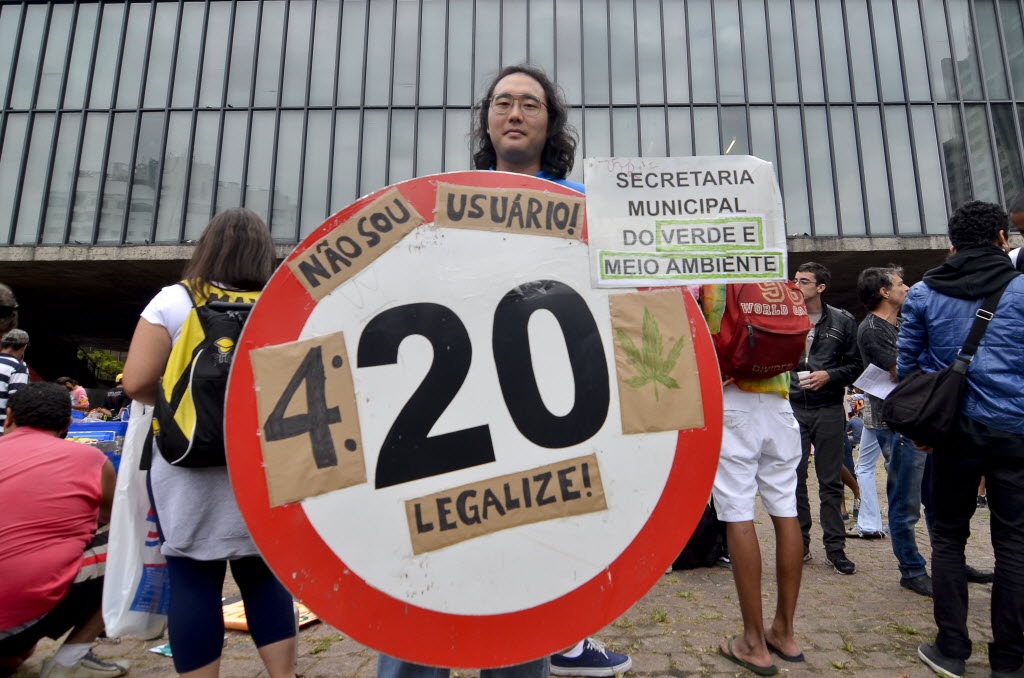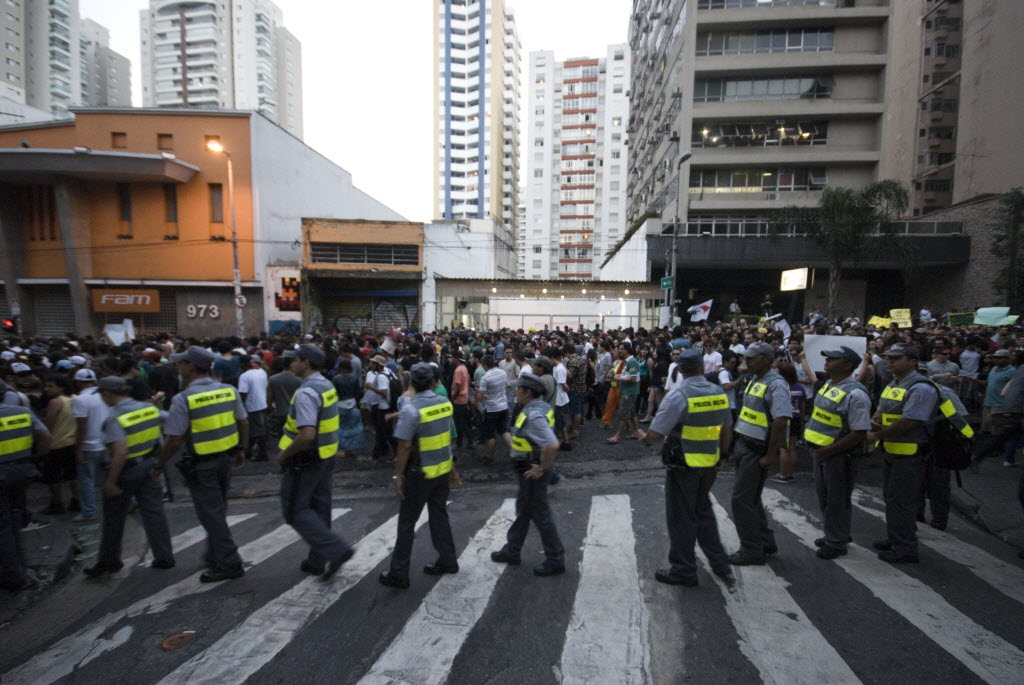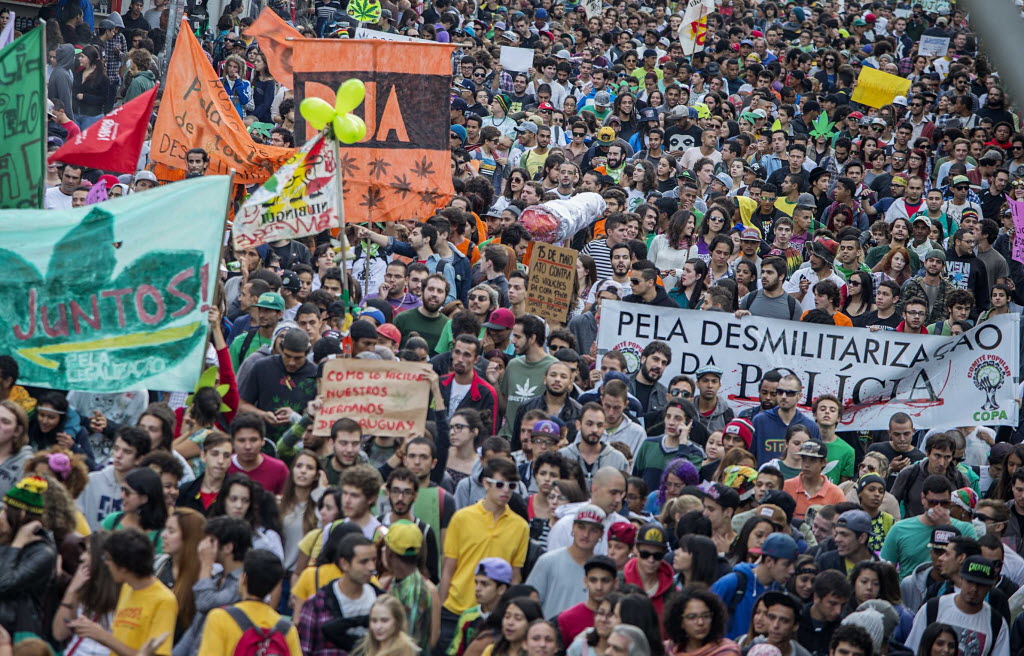As Uruguay and some US states legalize marijuana, Brazil’s police have softened their stance on São Paulo’s Marijuana March. But in a country with a huge prison population and neighborhoods dominated by violent drug traffickers, activists are pushing for more.
Claire Rigby
São Paulo
4:20pm on a Saturday in late April, and a rattle of firecrackers announces the departure of the annual Marcha da Maconha, or Marijuana March, from the open space beneath São Paulo’s immense MASP museum. ‘Soooou maconheiro, com muito orgulho e amor’, goes up a chant, a play on the ‘Sou brasileiro’ football chant (‘With much love and pride, I’m a Brazilian/I’m a pot-smoker’). Gathered in small clusters at the edge of the square, the Panini World Cup album swappers, who meet to shuffle through each others’ stacks of stickers here every Saturday, barely look up.
As the march spills onto Avenida Paulista and moves away, joints are rolled and lit and the scent of marijuana fills the air, drifting under the noses of passers-by and floating into cars stopped at traffic lights on the other side of the street, past a scattering of mainly traffic-handling police officers. Despite a large turnout that swells as the march moves through the streets, reaching anywhere between 3,000 (the police estimate) and 10,000 (the organisers’), the small, ultra-discreet police presence is completely at odds with other recent demonstrations here in São Paulo – and indeed, with previous Marchas da Maconha.
The march was prohibited here from 2008 to 2011 on the grounds that it promoted illegal behaviour, and at a series of small attempted demonstrations, banners were seized from protestors. In 2011, at a march in favour of the decriminalisation of cannabis at MASP, riot police fired tear gas at the protestors at close range in what became a marker – a small but perceptible turning point – in the lead-up to June 2013’s explosion of protest, and a harbinger of the police violence that would be carried out in full view at the heart of the city.
That 2011 march was followed by a Brazilian Supreme Court judgment in favour of the right to protest and of free expression over any issue; and this year, the police were almost entirely absent from the march, with just a handful of officers rolling down the road behind it, face-to-face with a long banner calling for the demilitarization of Brazil’s police, enveloping the parade’s rear-guard.
The politics of smoke
Despite pointedly bringing up the rear, the anti-police slogan was nevertheless far from being an afterthought. The profusion of leaflets being passed around – I counted almost a dozen varieties – the many banners and placards and the impassioned speeches given back at MASP spoke of far more than a Saturday afternoon shuffle through São Paulo’s streets. Despite the pungent herbal atmosphere, the smiles and the warm, languid intimacy of the march as it turned slowly down Rua Augusta towards Centro, the mood was decisively political, with a vision encompassing and extending far beyond arguments for herbal freedom, for cannabis’s medical applications, and health-based rationales relating to the relative harmful effects of alcohol and tobacco.
There’s an element of standing up and being counted to the movement, in the effort to normalize the debate and shift perceptions of drug users as criminal, marginal members of society. ‘If you do smoke, I think it’s only right to be open about it,’ says Larissa Marques, the well-connected co-owner of Agência Lema, one of São Paulo’s most powerful PR and branded content agencies. Marques is a member of Rede Pense Livre, a network of young movers and shakers encompassing journalists and lawyers, teachers and doctors as well as entrepreneurs and even financial market analysts, which is engaged in discussing national drug policy and promoting a sensible debate in Brasília and beyond.
With a timely agenda that goes to the heart of some of Brazil’s worst troubles, Pense Livre (‘Think Free), along with many of the people I spoke to on the march, links the prohibition of cannabis, and the resultant, massive law-enforcement operations, with some of Brazil’s most damaging problems. The militarization of Brazil’s favelas in the name of a domestic war on drugs has led to an exploding prison population – Brazil has the fourth largest incarceration rate in the world, with more than 35 per cent of convicts in for drug-related crime, the vast majority of them small-time dealers, apprehended unarmed and alone.

It’s not only the state’s enforcing of what many see as irrational laws, but collateral effects such as the real, profoundly violent criminality that underpins the drug trade, the fear and corruption it fosters – and the concomitant violent, racist and frequently murderous police actions in poor neighbourhoods. ‘AMARILDO, CLAUDIA, DG – NO TO RACIST VIOLENCE – POLICE DEMILITARIZATION NOW’, says one of the march’s largest banners, referring to the most recent, well-publicised deaths at police hands or in police custody.
‘Under prohibition, the only people who really suffer are in the favelas,’ says marcher Fábio Harano (photo above), brandishing a large sign saying ‘I AM NOT A [marijuana] USER. ‘You don’t have to be a woman to fight for women’s rights,’ he explains, ‘and I don’t need to be a smoker to be able to perceive the damaging effects of prohibition on Brazilian society as a whole.’ By the same logic, you don’t need to be a favela-dweller to stand up for the rights of the millions who live in Brazil’s immense urban and rural perifería – but in any case on this march, more than almost any march I’ve seen in São Paulo or anywhere, there’s a huge complement of the young urban poor mixed in with the students, the hipsters and the activists.
In a group of friends from a social class you don’t see much of on Avenida Paulista – that is ordinary, lower middle class Brazilians – a beautiful girl no older than 15 leans back and smokes on a spliff, smiling, for a press photographer, as her friends collapse in giggles, slapping each other with glee at her daring. At the junction of Paulista and Rua Augusta, as the march turns off the avenue and moves off down the hill, a TV cameraman zooms in on the hands of a boy deftly rolling a joint. ‘What made you want to come on the march?’ I ask the boy’s friend, Bruno Saraíva, aged 18, from São Miguel Paulista in São Paulo’s sprawling East Zone. ‘We want to be able to smoke freely.’ he says. ‘We’re doing nothing wrong, but people look down on us, think we’re marginaís’ [criminal, marginal]. ‘We’re doing no harm.’
The harm, as far as campaigners for decriminalization of marijuana are concerned, is being done to users and to society itself in an ill-considered, illogical war that can never be won: ‘the futility of criminalizing what is a standard consumer product’, as the Guardian writer Simon Jenkins put it in a wide-ranging recent article on Rio’s favelas.
Social justice and decriminalization
It’s that insight on the part of the anti-prohibition movement that has taken it from being a long-running single-issue campaign to one managing to articulate Brazil’s troubles with a clarity few other movements can manage – certainly not the many-headed hydra that is the anti-World Cup movement. The ‘Não Vai Ter Copa’ (‘there will be no Cup’) movement’s all-things-to-all-people tangle of grievances was brilliantly skewered in a recent post by Mauricio Savarese, a From Brazil contributor, in his blog ‘A Brazilian Operating in this Area’.
‘Prohibition is one of the key issues in the struggle for social justice in Brazil,’ says Rebeca Lerer, the founder of Pense Livre and a longtime campaigner for the decriminalization of cannabis use. ‘So many things stem from it. It has a huge impact on civil liberties and public health, on criminal justice and the prison system. Drug use has always had all sorts of cultural and religious implications, but it has been transformed into a crime, and that creates high levels of violence and corruption around it, as well as criminalizing the poor.’
Lerer lists some of the movements coming together around the campaign for decriminalization, including the patients’ movement – cannabis is useful in the treatment of a number of medical conditions – and feminism. According to the Brazilian Ministry of Justice, a disproportionate 47 per cent of women prisoners are inside for drug-related crime. There’s also a profoundly racial aspect to drug policing – in the USA, despite similar rates of drug use, 13 black people go to jail for every white person imprisoned, and racial profiling is also at the heart of Brazilian drugs policing, according to Lerer.
Lerer’s day-job is at the Global Commission on Drug Policy, whose 22 members include eight ex-presidents, including Brazil’s Fernando Henrique Cardoso, as well as Kofi Annan and Mario Vargas Llosa. She is also behind a ground-breaking exhibition that opens tonight in São Paulo at Matilha Cultural, a dynamic cultural centre on a gritty Centro street. ‘History of Cannabis: A Forbidden Plant’ features exhibits from Amsterdam’s Hash Marihuana & Hemp Museum, as well as a display by SemSemente, www.semsemente.com a Brazilian cannabis culture magazine, with a selection of flyers and memorabilia from the legalization movement over the last 20 years.

The movement appears to be mainly interested in the decriminalization of cannabis, or does it reach across the board to other drugs? Lerer cites statistics showing that despite the decades-long war on drugs, consumption has not decreased but on the contrary, drug use of all kinds has exploded, with illegal drugs freely available, even to minors, in what is an entirely unregulated market.
‘You have a right to know what you are putting in your body in terms of food,’ says Larissa Marques, ‘and I think people have the right to know what they are smoking.’ Fungus, mildew and pesticides are common contaminants in the fibrous plaques of cheap, pressed marijuana most commonly available in Brazil. Under prohibition, ‘people run the risk of being exposed to substances that are genuinely toxic,’ says Marques, whose PR agency also represents Matilha Cultural. ‘It’s about the right to information and freedom of choice: if marijuana were legal, it would be possible for people to monitor its quality in the same way as it is with foods and medicines.’
‘You shouldn’t smoke that shit,’ a friend told me once, years ago. ‘It’ll rob you of your ambition.’ For the campaigners for decriminalization, it seems to be doing the opposite. Moving on in leaps and bounds since 2011, says Rebeca Lerer, a critical mass seems to be forming around the need to reform drugs policy, with 20 US states, as well as Uruguay, Brazil’s neighbour, decriminalising cannabis use to one extent or another. Here in Brazil in early April, a Brazilian court authorised the importation of Cannabidiol, a cannabis extract, to treat severe epilepsy in the case of a 5-year-old girl, Any Fischer, making her Brazil’s first legal patient for medical cannabis.
Critical mass
As the march moves onto Rua da Consolação, approaching its destination at Praça Roosevelt, there’s a murmur of voices as people stroll and chat, enjoying the walk in the late, last-of-summer sun. ‘Marijuana, hashish, and then a sandwich!’ goes up a chant. Everyone laughs. No one is fiddling with their phones. A giant spliff, held aloft by green helium balloons, is released into the sky, and as it clears the height of the surrounding buildings, a little police helicopter darts towards it, circling it indecisively before moving aside and watching as float up, up and away. It’s what the marchers are asking: observation, regulation, minimal interference and the chance, perhaps, to let new dynamics emerge in place of the old, ruinous ones.
What has caused the changing attitudes? ‘Before the internet’, says Lerer, ‘It was very hard to access quality information. These days it’s far easier for people to check their facts, and to realize that not everything they are being told about cannabis use is true.’ Lerer mentions the ongoing, growing global debate on the so-called War on Drugs, and a forthcoming United Nations General Assembly Special Session on Drugs in 2016, whose timing may serve to crystallize the advances being made in the debate around drug policy internationally. ‘I think that if things progress as they have been, it’s not impossible that in the next 3-5 years, we may see real reform taking place,’ says Lerer.
And if any country should be helping to lead the way, she says, it’s Brazil. ‘Decriminalizing drug use is something Brazil could do immediately, as a first step,’ she says, to bring it into line with United Nations conventions on drug control. ‘I hope Brazil really understands that it plays a leading role, not only because of the relevance it has in a geopolitical sense in Latin America, but because we are one of the largest consumer markets for drugs in the world, with a growing incarcerated population and indices of violence that are among the worst in the world. We have more than enough reasons to look at this issue more carefully than most.’


